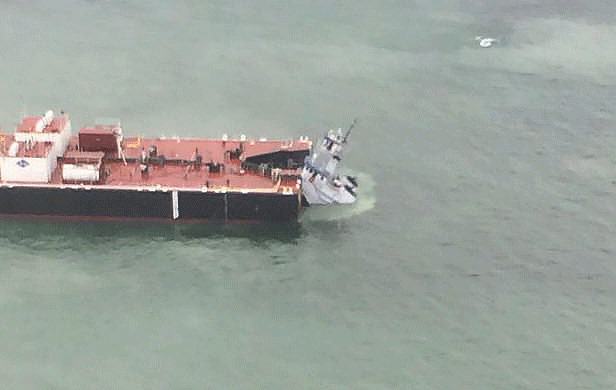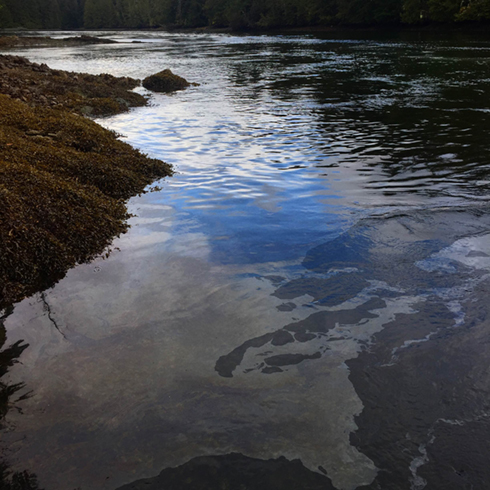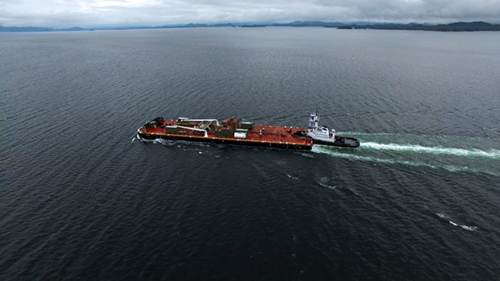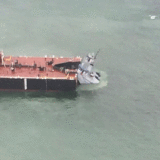
Updated 7 PM PST
A 10,000 tonne US-owned fuel barge, known as DBL 55, ran aground in Seaforth Channel on BC’s central coast early this morning and the tug that was towing it, the Nathan E. Stewart, is now leaking fuel into the highly sensitive marine environment of the Great Bear Sea.
According to Heiltsuk Nation authorities, in whose traditional territory the disaster is unfolding, the tug, believed to have had 60,000 gallons of fuel on board, sank at approximately 9:50 AM today. It is believed that three of its fuel tanks were compromised.
“Though we are thankful that the barge was empty, we are gravely concerned about the potential ramifications of the fuel spill from the tug,” stated Heiltsuk Chief Councillor Marilyn Slett.
“Our Gitga’at neighbours to the north are still unable to harvest clams and other seafoods ten years after the sinking of the Queen of the North. This spill area is in one of our primary breadbaskets, and we know that diesel is extremely difficult to recover.”
The barge, owned by Texas-based Kirby Corporation, ran aground near Gale Pass on Athlone Island, near the Heiltsuk community of Bella Bella, just after 1am, according to a Heiltsuk media release.
The Heiltsuk Integrated Resource Management Department (HIRMD) is concerned spilled marine diesel fuel from the tug could drift toward herring grounds and other sensitive areas with shifting winds and tides.
“It’s really bad out here. A lot of fuel is on the beach already, and fuel is in the water,” said HIRMD director Kelly Brown from the spill site.
[quote]The initial spill response has been totally inadequate. The first responding vessels were not equipped to deal with a spill, and had to return to town to gather more gear. The Heiltsuk are providing our own equipment because what responders have been able to provide so far is insufficient.[/quote]
According to Michael Lowry, a spokesperson from Western Canada Marine Response Corporation (WCMRC), the company with the contract to respond to fuel spills on the BC coast, local contractors came on the scene at approximately 11 AM this morning. Additional resources – including a mobile skimming vessel, a pair of boom skiffs, a work boat and a barge with response trailers – were dispatched from Prince Rupert this morning and expected to arrive on site by approximately 6 PM.

Some booms were deployed this afternoon, yet, according to Heiltsuk eyewitnesses, not across Gale Pass as of late this afternoon – due to a strong outflowing current that impeded efforts. This has meant a slick of diesel fuel made its way up the pass, which contains diverse marine life and is a key Heiltsuk site for clam digging and herring spawn on kelp. Fuel has also been spotted on nearby beaches and extending over the water.
Lowry noted that no recovery or skimming operations have begun at this stage. WCMRC will remain in “contain and protect mode” until a further assessment tomorrow morning, after which “recovery mode” may commence.

This is all cause for serious concern from the Heiltsuk, re-igniting calls for a proposed North Coast tanker ban to be implemented quickly – and for the scope to include such fuel barges, which have been quietly transiting these waters for years.
“This is a stirring reminder that the north coast oil tanker moratorium cannot be legislated fast enough,” said Slett. “We must take note, however, that tanker barges like this might not even be included in the ban. The ban needs to be complete, and spill response must be improved.”


Some interesting questions raised here.
How does a modern Tug with all its navigational siftware, pushing a barge, run aground.
Engine failure? Human failure?
Could it really be as simple as that?
Yup.
One can only wonder when the LNG tankers and the Bitumen tankers start sailing in these Northern coastal waters….will the crews rush to read the federal govt manual on 190 preconditions for safe passage of fuel? By flashlight when the engines fail?
’cause it will happen again. and it will happen at the worst possible time( winter storm) in the worst possible place( pristine wilderness untouched by pollution)
Glad to know we’ll also have Christy’s preconditions will keep the environment safe
Just food for thought. It is my understanding that the bc governent has had a ban on international transportation of feul in the inside passage. Never unforced. There is no benifits to Canada or bc to allow transportation in this route Send them to sea.
Why is no one questioning the cause of this accident. The weather was reported as, visibility 8 miles and winds of nine knots. Was there an engine failure, did some one fall asleep? Have the RCMP taken statements from the seven crew members? Someone shuld give the real news
and so we can see just how quickly the “world class” response is… and how effective… we have no idea what the impact will be, how many marine animals will perish, or what effect this will have on the resident humans. It’s sad, it’s frustrating, and it’s horrible.
All the rhetoric in the world won’t help clean this up, we need action, not words. Our Coast Guard should be expanded by at least five times the number of ships and crew and they should have First Responder capacity so they can start containing the spill immediately… before the “clean up crew” arrives. Instead of spending $$$ on war , spend that money on the protection of the coast!
Trudeau, Jim Carr and Catherine McKenna just don’t get it. Trying to please everyone will be their downfall. They should have erred on the side of our environment. We only have one of those.
Let’s think this through. Bella Bella is a marine community with no direct road links to the mainland. In order for the ships, cars, trucks, generators and other internal combustion engines to operate in the community they need fuel. That fuel is transported to town via barge. If you banned the transportation of fossil fuels via barge to the community then every diesel generator, boat, car, chainsaw, and truck would cease to function. Thus a barge ban might have some unintended negative consequences.
This barge transports fuel north to Alaska. It has nothing to do with servicing the local community in Bella Bella. In this case, thankfully, it was south-bound for refuelling, thus empty. The source of the leak was the tug towing it, which sank this morning.
So how do you suggest we “ban barges” on the coast? Do you hold up the American ones only (which you can’t by maritime law) and let the Canadian ones go by? The Americans have honoured the Canadian tanker ban but don’t legally have to. Either you ban them all or you ban none and if you ban them all then Bella Bella loses all its fuel and the fishing fleet gets put on shore and the diesel generators run dry. That is simply how international law works
Good question. I suppose you could set limits on size (this one is relatively large at 10,000 tonne capacity) or direct them to transit international waters beyond the sensitive marine ecosystems and communities of the inner coast.
Canada does have a legal right to have a ban tankers on the BC north coast, a promise that was made by J. Trudeau before the election and which he is now being pressured to keep. We also have an absolute right to restrict vessels in inshore waters. The Nathan E. Stewart was in transit through the inside passage without a Canadian pilot by special dispensation from the Coast Guard. That dispensation has now been revoked. Whoop-de-doo!
They can’t find the sunken tug because they don’t know where the “Great Bear Sea” is, must be close to the “Salish Sea”.
Quit screwing with charted names get your info correct instead of hype, and you might make some valid points.
This would be the same Village that had 2 derelict boats that sank at there own dock last spring. I wonder where they are going to get there fuel from if they keep up the rhetoric?
My comment is awaiting moderation, what does that supposed to mean, any of you so called journalists ever even been up there? Give it a shot you might learn something.
I can’t speak for other journalists, but I’ve been there on over 30 occasions. One of my favourite places in the world.
The Great Bear Rainforest/Sea is a more recognizable term for the central coast than the “central coast” is today (also cited in the piece). Used on many maps and in official government communications, it’s a term people instantly recognize and understand today.
Other more specific locations like “Seaforth Channel”, “Gale Pass” and “Athlone Island” were also cited in the story. All of those are easily located on marine charts.
Check your most current marine charts and government maps and you will also find that the Salish Sea is now the official name for what we once called The Georgia Strait. No one, aside from yourself, is remotely confused by this. In fact, it is simply returning the region to its original, indigenous name. But then, you probably still insist on using the Queen Charlottes instead of Haida Gwaii. LOL.
Unfortunately, this spill will have damaging consequences for the place, no matter what you call it.
Actually, the Strait of Georgia still exists, it is part of a much larger body of water now known as the Salish Sea.
Here is an excerpt from a CBC article:
The new name doesn’t replace any of the existing official names for Puget Sound, the Juan de Fuca Strait or the Strait of Georgia near Vancouver.
Instead the original names will be retained, but the name Salish Sea will be used to indicate the entire area. The name refers to the language of the First Nations groups that originally occupied the area.
Thanks James. That’s a helpful clarification.
that’s was my question where the hell is the “Great Bear Sea” have lived on the north coast my whole life and have never heard of it…..
Again, for those who find this confusing, other terms more familiar to you are also used: Central Coast, Seaforth Channel, Gale Pass, Athlone Island. So we’re covered either way.
The Western Canadian Marine Response Corporation has to be replaced by an expanded Coast Guard.